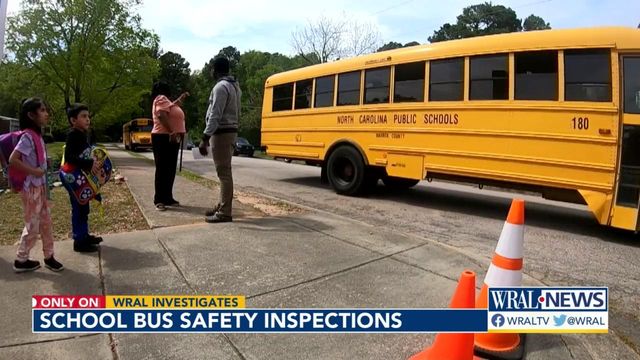Fuel leaks, faulty stop signs: How the pandemic has impacted NC's school buses
Around 800,000 students ride the school bus each year, but as WRAL Investigates found, not all those school buses are up to standard. A lack of resources and staff are contributing the current increase in school buses that are not up to state regulations.
Posted — UpdatedA lack of resources and staff are contributing the current increase in school buses that are not up to state regulations.
The state inspects 10% of a school system's fleet each year to check for mechanical issues and to make sure that buses have all proper lights and signage on them. Each time there's something wrong with a bus, points are added to the bus' defect score. A higher score is worse, and the ideal score is 0.
In central North Carolina, Warren County Public Schools received the worst average school bus score at 78.75.
"We were very concerned," said Warren County Superintendent Keith Sutton. "When we don’t have enough staff, sometimes those things go unchecked."
After the state skipped 2020 inspections during the coronavirus pandemic, WCPS hired Superintendent Sutton and another mechanic. While the district's score was an improvement from last year, it still ranks worse than neighboring counties.
"We are not [satisfied]. There’s still room to grow," he said. "There’s still room to improve."
School districts in Hoke, Johnston and Nash counties also received poor inspection scores this year.
Hoke County’s Bus 105 takes the dubious honor of most defect points with 157. The bus was parked with a laundry list of issues, including two serious violations with its manifold and cooling system.
WRAL News found that many points were added to a bus' score if they didn't have hand sanitizer on board.
Sutton feels the inspection scores certainly highlight deficiencies that need to be addressed, but he said parents should feel comfortable about their sending their children to school.
"I don’t think they should be largely concerned with their children’s safety," he said. "We’re not going to put a bus that’s not safe on the road."
Despite the inspection record, WCPS reports no crashes or injuries due to missed maintenance. Across the state, driver error is blamed for more crashes than maintenance issues.
On the flip side, Lee County buses had the fewest defect points.
Wake County buses are the seventh best in the area, with an average defect score of 27.51.
On average, the state parked 25% percent of buses after the most recent inspections until repairs could be made.
"All of this is important. Our kids start and end the day getting on and off a school bus. We’re going to continue to focus on safety," Sutton said.
Two area school systems, Cumberland and Johnston, weren’t inspected at all in 2020 or 2021 during the pandemic.
Related Topics
• Credits
Copyright 2024 by Capitol Broadcasting Company. All rights reserved. This material may not be published, broadcast, rewritten or redistributed.






